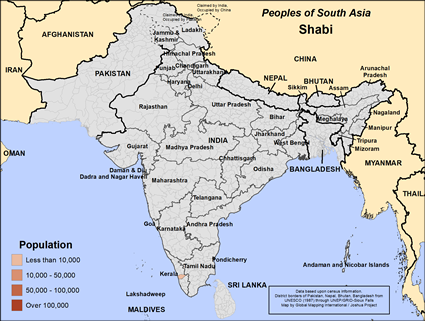Shabi in India

Photo Source:
Anonymous
|

Map Source:
People Group data: Omid. Map geography: UNESCO / GMI. Map Design: Joshua Project
|
| People Name: | Shabi |
| Country: | India |
| 10/40 Window: | Yes |
| Population: | 1,700 |
| World Population: | 1,700 |
| Primary Language: | Malayalam |
| Primary Religion: | Islam |
| Christian Adherents: | 0.00 % |
| Evangelicals: | 0.00 % |
| Scripture: | Complete Bible |
| Ministry Resources: | Yes |
| Jesus Film: | Yes |
| Audio Recordings: | Yes |
| People Cluster: | South Asia Muslim - other |
| Affinity Bloc: | South Asian Peoples |
| Progress Level: |
|
Introduction / History
The Muslim Shabi people in Kerala have a background primarily connected to trade, agriculture and traditional crafts. They primarily speak Malayalam, the predominant language their home state of Kerala along with some Arabic due to religious practices.
What Are Their Lives Like?
The Shabi people live in both rural villages and urban areas, focusing on trade, farming, and small-scale craftsmanship. They grow crops such as rice, coconuts, and spices. Many also engage in weaving, pottery, and other artisanal crafts, contributing to their local economy. Their diet includes both vegetarian and non-vegetarian food, featuring staples like rice, lentils, vegetables, fish and meat. Traditional dishes such as biryani, pathiri (rice pancakes), and various curries are common in their meals.
Weddings among the Shabi are elaborate, involving Muslim rituals like the nikah (marriage contract), walima (wedding feast), and celebrations with music, dance and communal feasting. These events typically span several days and involve extensive community participation.
What Are Their Beliefs?
The Shabi people practice Islam, observing religious rituals and festivals such as Eid al-Fitr, Eid al-Adha, and Ramadan. Their belief system emphasizes values like faith (iman), prayer (salat), and charity (zakat). They conduct rituals and ceremonies to honor their religious obligations and integrate elements of their daily life and occupations into their spiritual practices.
What Are Their Needs?
The Shabi people need better access to quality education to provide more opportunities for their children. Improved healthcare services are essential due to the limited availability of medical facilities and high rates of preventable diseases. Economic support through vocational training, modern agricultural practices, and sustainable craftsmanship techniques can enhance their livelihoods. Infrastructure development, including better roads, clean water supplies, and reliable electricity, will greatly benefit the Shabi community.
Prayer Points
Pray for Shabi elders and family leaders to have dreams of the risen Christ that will draw them to seek and find him.
Pray the Lord will give Shabi leaders spiritual hunger, then satisfy that hunger with Christ.
Pray for a movement to Christ within the Shabi community.
Pray for Shabi families to accept the abundant blessings and guidance offered only by Jesus Christ.